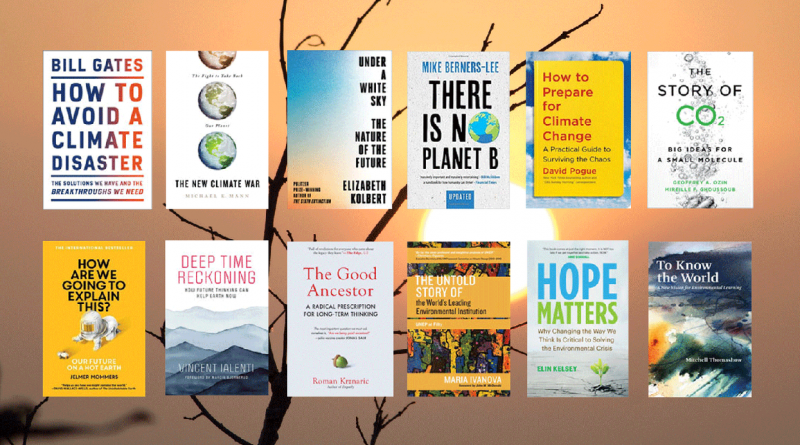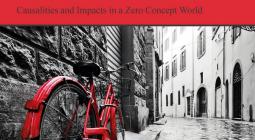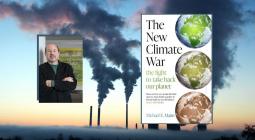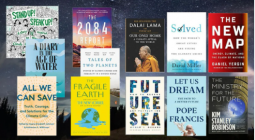12 New Books Explore Fresh Approaches to Act on Climate Change

Despite a journey to this moment even more treacherous than expected, Americans now have a fresh opportunity to act, decisively, on climate change.
The authors of the many new books released in just the past few months (or scheduled to be published soon) seem to have anticipated this pivotal moment.
Their number includes a scientist, an entrepreneur, and a journalist, each of whom has published among the first calls to action on climate change: Michael Mann, Bill Gates, and Elizabeth Kolbert.
But all the authors recognize that our repeated failures to seize previous opportunities says something about our market economy, our mindsets, and our political institutions. Thus the solutions offered in these new titles are as often political as they are scientific and technical, and psychological as often as they are environmental.
Americans succeeded in making a critical change: a climate denier no longer presides over the United States. With the 12 titles listed below, Americans can now consider new possibilities – at all levels – made possible by that first change.
As always, the descriptions of the 12 titles listed below are adapted from copy provided by the publishers.
1. The New Climate War: The Fight to Take Back Our Planet, by Michael E. Mann (Public Affairs 2021, 368 pages, $29.00) (Editor's note: A separate book review on this title will be posted soon at this site.)
In The New Climate War, renowned climate scientist Michael Mann shows how fossil fuel companies have waged a thirty-year campaign to deflect blame and responsibility and delay action on climate change. But all is not lost. In his new book, Mann outlines a plan for forcing our governments and corporations to wake up and make real change, by allowing renewable energy to compete fairly against fossil fuels, by debunking the false narratives and arguments that have worked their way into the climate debate, and by combatting climate doomism. The societal tipping point necessary to win the new climate war won't happen without the active participation of citizens everywhere aiding in the collective push forward.
2. How to Avoid a Climate Disaster: The Solutions We Have and the Breakthroughs We Need, by Bill Gates (Penguin Random House 2021, 272 pages, $26.95)
In this urgent, authoritative book, Bill Gates sets out a wide-ranging, practical – and accessible – plan for how the world can get to zero greenhouse gas emissions in time to avoid a climate catastrophe. Drawing on his understanding of innovation and what it takes to get new ideas into the market, he describes the areas in which technology is already helping to reduce emissions, where and how the current technology can be made to function more effectively, where breakthrough technologies are needed, and who is working on these essential innovations. As Bill Gates makes clear, achieving zero emissions will not be simple or easy to do, but if we follow the plan he sets out here, it is a goal firmly within our reach.
3. Under a White Sky: The Nature of the Future, by Elizabeth Kolbert (Penguin Random House 2021, 256 pages, $28.00)
In Under a White Sky, Elizabeth Kolbert takes a hard look at the new world we are creating. Along the way, she meets biologists who are trying to preserve the world's rarest fish, which lives in a single tiny pool in the middle of the Mojave; engineers who are turning carbon emissions to stone in Iceland; Australian researchers who are trying to develop a "super coral" that can survive on a hotter globe; and physicists who are contemplating shooting tiny diamonds into the stratosphere to cool the earth. One way to look at human civilization, says Kolbert, is as a ten-thousand-year exercise in defying nature. By turns inspiring, terrifying, and darkly comic, Under a White Sky is an utterly original examination of the challenges we face.
4. There Is No Planet B, Updated Edition, by Mike Berners-Lee (Cambridge University Press 2021, 321 pages, $12.95 paperback)
Hunger, climate change, biodiversity, antibiotics, plastics, pandemics – the list of concerns seems endless. But what is most pressing, and what should we do first? Do we all need to become vegetarian? How can we fly in a low-carbon world? How can we take control of technology? And, given the global nature of these challenges, what can any of us do as individuals? Mike Berners-Lee has crunched the numbers and plotted a course of action that is full of hope, practical, and enjoyable. He offers a big-picture perspective on the environmental and economic challenges of our day. This updated edition has new material on protests, pandemics, wildfires, investments, carbon targets and of course, on the key question: given all this, what can I do?
5. How to Prepare for Climate Change: A Practical Guide to Surviving the Chaos, by David Pogue (Simon & Schuster 2021, 624 pages, $24.00 paperback)
In How to Prepare for Climate Change, bestselling self-help author and beloved CBS Sunday Morning science and technology correspondent David Pogue offers sensible, deeply researched advice for how we should start to ready ourselves for the years ahead. Pogue walks readers through what to grow, what to eat, how to build, how to insure, where to invest, how to prepare your children and pets, and even where to consider relocating when the time comes. He also provides wise tips for managing your anxiety. Timely and enlightening, How to Prepare for Climate Change is an indispensable guide for anyone who read The Uninhabitable Earth or The Sixth Extinction and wants to know how to make smart choices for the upheaval ahead.
6. The Story of CO2: Big Ideas for a Small Molecule, by Geoffrey A. Ozin and Mireille F. Ghoussoub (University of Toronto Press 2020, 280 pages, $34.95)
The climate crisis requires that we drastically reduce carbon dioxide emissions across all sectors of society. The Story of CO2 contributes to this challenge by highlighting the cutting-edge science and emerging technologies that can transform carbon dioxide into a myriad of products such as feedstock chemicals, polymers, pharmaceuticals, and fuels. This approach allows us to reconsider CO2 as a resource, and to add "carbon capture and use" to our other tools in the fight against catastrophic climate change. The Story of CO2 seeks to inspire readers with the latest carbon utilization technologies and explain how they fit within the broader context of carbon mitigation strategies in the shift towards a sustainable energy economy.
7. To Know the World: A New Vision for Environmental Learning, by Mitchel Thomashow (The MIT Press 2020, 288 pages, $30.00 paperback)
How can we respond to the current planetary ecological emergency? In To Know the World, Mitchell Thomashow proposes that we reinvigorate how we think about our residency on Earth. Mixing memoir, theory, mindfulness, pedagogy, and compelling storytelling, Thomashow discusses how to navigate the Anthropocene's rapid pace of change without further separating psyche from biosphere; how to achieve constructive connectivity in both social and ecological networks; and why we should take a cosmopolitan bioregionalism perspective that unites local and global. Throughout, Thomashow invites readers to participate as explorers, encouraging them to better understand how and why environmental learning is crucial to human flourishing.
8. Deep Time Reckoning: How Future Thinking Can Help Earth Now, by Vincent Ialenti (The MIT Press 2020, 208 pages, $25.00)
We live on a planet careening toward an environmental collapse that will be largely brought about by our own actions. And yet we struggle to grasp the scale of the crisis, barely able to imagine the effects of climate change just ten years from now, let alone the multi-millennial timescales of Earth's life span. In this book, political economist Vincent Ialenti takes on two overlapping crises: the Anthropocene, our current moment of human-caused environmental transformation, and the deflation of expertise – today's popular mockery and institutional erosion of expert authority. The second crisis, he argues, is worsening the effects of the first. Hearing out scientific experts who study a wider time span than a Facebook timeline is key to tackling our planet's emergency. This is the kind of time literacy we need if we are to survive the Anthropocene.
9. The Untold Story of the World's Leading Environmental Institution: UNEP at Fifty, by Maria Ivanova (The MIT Press 20201, 384 pages, $30.00 paperback)
The United Nations Environmental Programme (UNEP) was founded in 1972 as a nimble, fast, and flexible entity at the core of the UN system – a subsidiary body rather than a specialized agency. In this book, Maria Ivanova offers a detailed account of UNEP's origin and history and a vision for its future. Ivanova counters the common criticism that UNEP was deficient by design, arguing that UNEP has in fact delivered on much (though not all) of its mandate. UNEP's fiftieth anniversary, Ivanova argues, presents an opportunity for reinvention. She envisions a future UNEP that is the go-to institution for information on the state of the planet, a normative vision of global environmental governance, and support for domestic environmental agendas.
10. How Are We Going to Explain This? Our Future on a Hot Earth, by Jelmer Mommers (Simon & Schuster 2020, 224 pages, $16.95 paperback)
If climate change is the biggest threat humanity has ever faced, then why are we doing so little about it? Journalist Jelmer Mommers knows most people prefer not to talk or even think about climate change, and that is exactly why he wrote this book. Denial and despair are not the only possible responses to the current crisis. Drawing on the latest science, Mommers describes how we got here, what possible future awaits us, and how you can help make a difference. Five years in the making, How Are We Going to Explain This was an instant bestseller in the Netherlands. This updated translation, which includes responses to the COVID-19 pandemic, brings Mommers' unique blend of realism and hope to the wider world.
11. The Good Ancestor: A Radical Prescription for Long-Term Thinking, by Roman Krznaric (The Experiment 2020, 288 pages, $25.95)
"Are we being good ancestors?" asked Jonas Salk, who developed the polio vaccine in 1953 but refused to patent it – forgoing profit so that more lives could be saved. Salk's generosity to future generations should inspire us. But when philosopher Roman Krznaric examines society today, he sees just the opposite: Our short term mindsets have "colonized the future." In The Good Ancestor, Krznaric reveals six practical ways we can retrain our brains to think of the long view, including Deep-Time Humility (recognizing our lives as a cosmic eyeblink) and Cathedral Thinking (starting projects that will take more than one lifetime). He aims to inspire more "time rebels" like Greta Thunberg – to shift our allegiance from this generation to all humanity.
12. Hope Matters: Why Changing the Way We Think Is Critical to Solving the Environmental Crisis, by Elin Kelsey (Greystone Books 2020, 240 pages, $22.95 paperback)
We are at an inflection point: today, more people than ever before recognize that climate change and biodiversity loss are urgent and existential threats. Yet constant reports of climate doom are fueling an epidemic of eco-anxiety. Hope Matters boldly breaks through the narrative of doom and gloom that has overtaken conversations about our future to show why hope, not fear, is our most powerful tool for tackling the planetary crisis. Award-winning author, scholar, and educator Elin Kelsey describes effective campaigns to support ocean conservation and species resilience, and rewilding. And she shows how we can build on these positive trends and harness all our emotions about the changing environment into effective personal and political action.
We encourage readers to suggest titles for future bookshelves by contacting the bookshelf editor. We welcome review copies but suggest first contacting the editor prior to sending PDFs or print copies.
23 January 2021
EcoWatch




